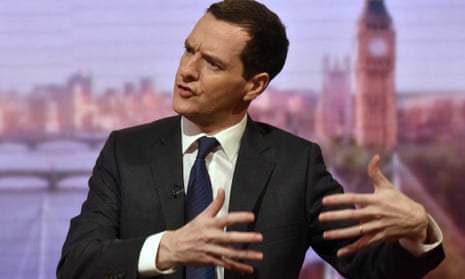It is almost 20 years since Ken Clarke delivered the last purely Conservative budget in the dog days of John Major’s government. A lot has happened since the Cool Britannia year of 1996: the economy has boomed and gone bust; the euro has arrived; an independent Bank of England sets interest rates; and the gap between the super rich and the rest has widened.
All these developments will shape the package of measures George Osborne is to announce on Wednesday. In 1996, Clarke realised his party was going down to defeat. Knowing it was his swansong, he included spending cuts in his last budget, little thinking that Gordon Brown would stick to them. Osborne, by contrast, has the assurance of the victor, of a chancellor who knows that he can plan for a whole parliament and is already thinking about how to win again in 2020.
Politically, Osborne is in a much better position than Clarke was in 1996. He faces a demoralised Labour party that is allowing the Conservatives to frame the debate during the crucial months after a general election, just as it did after the 2010 election.
It is a much more mixed picture when it comes to the economy. Back in 1996, the balance of payments actually balanced and the big hole in the public finances left by the recession of the early 1990s was virtually repaired. Today, Osborne presides over an economy with a twin deficit problem: a current account deficit running at 6% of national income and a budget deficit of about the same size.
What’s more, when Clarke left office in 1997, the newly independent Bank of England raised interest rates to 7.5%. That gave Threadneedle Street plenty of scope to cut the cost of borrowing if the economy ran into difficulties. There is no such headroom today. Official interest rates remain where they were when Osborne became chancellor, at a record low of 0.5%.
There have been other developments. Britain’s North Sea oil production peaked at the end of the 1990s and is in decline. Manufacturing’s share of the economy has fallen to little more than 10%. The nation’s economic centre of gravity has shifted even more towards London and the south-east. A minimum wage and tax credits have been introduced to deal with the problem of low pay.
Osborne has a number of challenges in the budget. One of them is how to get the balance right between monetary and fiscal policy. Monetary policy is what the Bank of England does, and includes setting interest rates and using quantitative easing to create money. Fiscal policy is what the Treasury does, and involves setting tax rates and spending public money.
Osborne will announce significant spending cuts on Wednesday, targeting welfare payments and Whitehall departments. As with the austerity measures taken after the 2010 election, these will have the effect of slowing the economy, leaving the onus on the Bank to keep things ticking over. That is likely to mean that interest rates stay lower for longer than would otherwise be the case.
There are two risks here. One is that, with interest rates almost at zero, monetary policy is less effective than it once was. The second is that ultra-stimulative monetary policy was supposed to be an emergency measure, and continuing with it for more than six years leads to asset bubbles, reckless speculation and, ultimately, the next crash. The body that represents the world’s central banks, the Bank for International Settlements, recently warned of the dangers of the once abnormal becoming the new normal, and it is right to do so.
Osborne got his judgement wrong in 2010, cutting too aggressively when the economy was still in the early stages of rehab following the slump of 2008-09. He was later forced to ease up on the pace of deficit reduction when the economy slowed far more quickly than he anticipated. Getting it wrong again would be inexcusable.
A further challenge is to make welfare cuts without damaging the “hard-working people” championed by the Conservatives during the election campaign. It was rare to see Osborne out on the stump without a hard hat and hi-vis jacket, so intent was he on showing that the Tories rather than Labour were on the side of those struggling to earn a living.
Many of those who work in the warehouses and construction sites the chancellor visited ahead of polling day have their wages topped up by tax credits, but they will need to be cut on Wednesday if the Treasury is to find £12bn in welfare savings.
In principle, there is nothing wrong with the government’s approach. Tax credits let bad employers off the hook, because they know that they can pay poverty wages safe in the knowledge that they will be topped up by the tax and benefits system. Many Conservatives think the state should not have to foot the bill, which has now grown to £30bn a year, simply because companies refuse to pay their staff enough to live on.
On the BBC’s Andrew Marr Show, Osborne said the solution was to cut taxes so that workers kept more of what they earned. It is, however, not quite as simple as that, given that almost 6 million workers don’t earn enough to pay income tax. They will be net losers – in many cases big net losers – when tax credits are cut, unless employers can be forced, cajoled or shamed into paying higher wages. The chancellor must not be allowed to duck this challenge.
Finally, the first budget of a parliament is the moment for a shakeup of the tax system , because any changes have a chance to bed down before the next election. So far, Osborne has been more of a tinkerer than a radical reformer, but there are two candidates for action if he favours boldness. The first would be moves towards the eventual merging of income tax and national insurance, something that would help the lowest paid more than raising tax thresholds. The second would be a comprehensive overhaul of property taxation to make it less generous and more progressive.
The signs are not especially good. Osborne, like his predecessors, has three iron laws: never raise the basic rate of income tax; never upset pensioners; and never do anything that might result in the price of homes going down. Hence the decision to make inheritance tax more generous and the refusal to touch council tax.
Osborne has a fourth law: mention Greece at every opportunity. Five years ago, the chancellor used the first manifestation of the Greek crisis to justify austerity. He will repeat that message on Wednesday. The budget has been overshadowed by the drama in the eurozone but he won’t mind that a bit. For him, Greece is the gift that keeps on giving.

